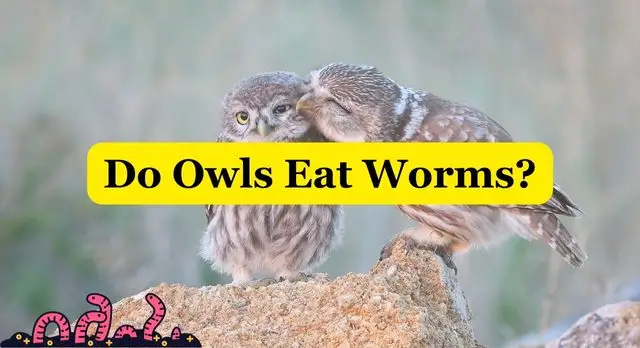Do Owls Eat Worms? The Secret Hunters
Owls have long captured our fascination with their silent flight and piercing gaze. These nocturnal predators are known for their incredible hunting skills, but what exactly is on the menu for these enigmatic birds? One question that often arises is, “Do owls eat worms?” In this comprehensive article, we will explore the dietary habits of owls and unravel whether worms play a significant role in their diet.

Do Owls Eat Worms?
Owls are renowned for their diverse and adaptable diets, which primarily consist of small mammals, birds, reptiles, and insects. While worms may not be a staple part of their diet, owls are opportunistic hunters and will consume worms if the circumstances allow. However, it’s important to understand the factors that influence their worm consumption and the extent to which worms contribute to their overall diet.
Factors Influencing Owl’s Worm Consumption
Several factors play a role in determining whether owls will eat worms. Let’s delve into these factors:
- Habitat: Owls inhabit various environments, including forests, grasslands, and wetlands. In these habitats, worms are abundant in the soil and are readily available for owls to consume.
- Nocturnal Feeding Habits: Owls are nocturnal hunters, relying on their exceptional night vision and hearing to locate prey. While they primarily hunt mammals and birds, they will opportunistically prey on worms and other small creatures if encountered during their hunting forays.
- Food Availability: The presence of worms in an owl’s environment significantly influences their consumption. If worms are plentiful and easily accessible, owls may incorporate them into their diet as a supplementary food source.
- Predatory Nature: Owls are skilled predators and will seize opportunities presented to them. If worms are within striking range and owls detect their movements, they may take advantage and capture them.
Benefits and Significance of Worm Consumption for Owls
While worms may not be a primary component of an owl’s diet, their consumption offers certain benefits and significance:
Benefits:
Nutritional Value: Worms are rich in protein, offering essential nutrients for owl’s growth, development, and energy requirements.
Dietary Diversity: Including worms in their diet allows owls to broaden their nutrient intake and adapt to fluctuations in prey availability.
Significance:
Ecosystem Balance: Owls play a crucial role in maintaining the balance of their ecosystems. Their consumption of worms contributes to the regulation of worm populations, preventing overgrowth and potential ecological imbalances.
Key Takeaway
In conclusion, while worms may not be a primary dietary component for owls, they are opportunistic hunters and will consume worms if available and within reach. Owls primarily rely on a diverse range of prey, including small mammals, birds, reptiles, and insects. Worms serve as a supplementary food source for owls, offering nutritional value and contributing to their adaptability as skilled predators. Understanding the feeding habits of owls and their interaction with worms enhances our knowledge of these captivating birds and their role in maintaining ecological equilibrium.
FAQs
Do owls eat earthworms?
Yes, owls can eat earthworms. While earthworms may not be a primary part of their diet, owls are opportunistic hunters and will consume worms if they come across them while hunting for prey.
Would an owl eat a worm?
Yes, an owl would eat a worm if it encounters one during its hunting activities. Owls are skilled hunters and will seize opportunities to consume worms and other small creatures if they are within striking range.
Do owls get worms?
Owls, like other animals, can get internal parasites, including worms. However, it’s important to note that the presence of worms in owls can vary depending on factors such as their habitat, prey species, and overall health. Regular veterinary care and a balanced diet can help minimize the risk of worms in owls.
Do barred owls eat worms?
Barred owls are known to have a varied diet that includes small mammals, birds, reptiles, and insects. While worms may not be a primary component of their diet, barred owls are opportunistic hunters and may consume worms if they encounter them while hunting for food. Their diet primarily consists of a diverse range of prey species.
